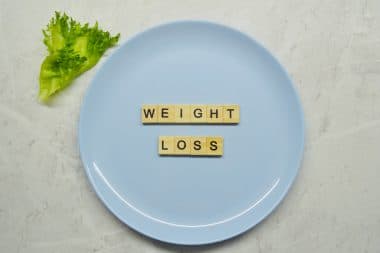We often get comments or emails to the effect of, how many calories should i eat to lose weight? Since age, current weight, current activity levels all factor into this, there is not a simple one size fits all solution. Keep reading and we will show you the tools that will allow you to answer how many calories for yourself.
An important component of every weight loss diet is the creation of a caloric deficit. A caloric deficit occurs when you consume fewer calories than your body burns off. Since there is this imbalance, your body will use its fat stores to make up for the deficit. Your body needs to have energy for all of its activities. Whether moving, breathing, digesting, or exercising, your body needs to power these activities with energy from calories.
This is why you lose weight when you have a calorie deficit. In addition to cutting your calories through food intake, any sensible diet will include lots of physical activity. This activity both speeds up your metabolism and helps to create a greater caloric deficit.
The Size of the Caloric Deficit
Now that we know that you must create a caloric deficit to lose weight, the question becomes what size of deficit is advisable. There are three things that need to be kept in mind when planning how big your caloric deficit should be:
1. Maximize your fat loss
2. Minimize your muscle loss
3. Control your caloric intake in a way that you will be able to carry out in the short run and the long run as well.
A Small Caloric Deficit
When you cut few calories from your diet, the challenge of sticking to your diet is very small. You probably won’t notice too many hunger pangs, and not many dietary changes are needed. Also, the potential for muscle loss is minimal.
The downside of a low caloric deficit is that you will not be losing all that much weight. The speed at which you will lose weight may be too slow for you.
A Large Caloric Deficit
With a large caloric deficit, the rate of weight loss will increase. However, for many people, it is hard to maintain a diet where you don’t get to eat that much. Also, a large deficit will increase the potential for muscle loss. Therefore, in the long term, you will not be very successful with this form of weight loss. It is said that over 90% of people who go on crash diets will not permanently keep the weight off.
A Moderate Caloric Deficit
That leaves us with a moderate caloric deficit as the best way to lose weight. You minimize the potential for muscle loss, and you will be more likely to adhere to your diet in a permanent way.
So, what is the daily caloric intake for a moderate diet? The best suggestion is to eat 20% less calories per day. There are 3,500 calories in a pound of weight. That means that someone who eats 2,000 calories a day will cut out 400 calories a day out of their diet. They will lose a pound of weight about every nine days.
Another way of doing things is to calculate your BMR or basal metabolic rate. You can use the calculator at https://www.healthstatus.com/calculate/basal-metabolic-rate to determine what it is. Your basal metabolic rate is the amount of calories that you burn up just surviving. The basic rule is that you must consume the amount of calories in your BMR or greater. This means that when you subtract the amount of exercise calories from your total calories for the day, the difference is at least what your body needs to support its vital processes.
If you don’t consume at least the amount of calories in your basal metabolic rate, then your body gets the message that you are starving. When the body tries to resolve the perceived starvation, it will use stored carbohydrates, fat, or protein as a source of energy. The body usually uses muscle as a last resort to gain energy. However, muscle tissue requires more calories than any other tissue. Therefore, the body will metabolize muscle so that it will reduce the number of calories needed per day. This is not good either for your body or your heart.
This is why you should take BMR requirements seriously. Therefore, you should aim to create a calorie deficit of between 500 and 1,000 calories per day. More than this may drive your net calories below your BMR.
Daily Activity
You need to do exercise to burn off more calories to offset your daily calorie intake. A calorie is a measure of energy. The amount of energy that you use in doing an activity is measured by the calorie burn rate. There are 3,500 calories in one pound.
Everyone is busy with their lives, and it is hard to get the exercise that you need to burn calories. Fortunately, there are some simple things that you can do to get some exercise around the house or office.
Stair Climbing
Stair climbing burns a lot of calories. A 140 pound woman will burn nine calories per minute running up stairs. You certainly can find the time to run up and down the stairs at home at some point in the day.
Get Active in Your Office
Most people who sit behind a desk at work find it hard to get the amount of activity that they need to burn those extra calories. If this is you, you can improve your situation by simply getting up at frequent intervals and walking around the office. You can walk back and forth while you are on a call or move to the music on the radio in your chair too. You will be surprised at how many calories you can burn every day with these tips.
A Little Bit of Interval Training
Since you don’t have enough time to spend an hour at the gym, consider high intensity interval training. The way that you do this is to exercise at a feverish pace for 60 seconds and then take a break for 60 seconds. You should repeat this for 20 minutes at a time. It has been shown in research that a 20-minute high intensity interval training workout boosted metabolism just as much as 50 minutes of cycling at a steady pace during the 24 hours following the exercise.
You can use the calculator at https://www.healthstatus.com/calculate/cbc to figure out how many calories you burn with various exercises.
Keeping a Calorie Journal
When you make the decision to reduce the amount of calories in your diet and get adequate exercise, a good way of keeping track of things is to keep a calorie and exercise journal.
The way that you start is by getting a baseline of what you currently eat and how much you currently exercise. This will serve as an input to figure out how much you need to decrease your intake and increase your exercise. Not only should you keep track of the numbers, but also you need to keep track of how you feel and what your mood is like. This way, you can tell if the amount of calories that you reduce is affecting your well-being or not. Remember that you need to keep a diet that you will always be able to keep. A short-term diet will not work. You need something that you can adhere to always.
If you are interested in losing a lot of weight, you should aim to lose no more than two pounds a week. Any more than this will both affect your well-being and may be hazardous to your health. Remember that when you go below your BMR, you can end up losing muscle mass when you diet.
Are All Calories Created Equal?
Research suggests that the idea that all calories are equal is a fallacy.
A study that appeared in the Journal of the American Medical Association found that participants who ate different diets with the same amount of calories burned different amounts of calories. In one group, the participants ate a low-fat diet. Another group ate a very-low-carb diet. The third group ate a low-glycemic-index diet. Even though the groups ate the same amount of calories, the group that ate low-fat burned 300 calories a day less than the group that ate very-low-carbohydrate.
Both the very-low-carb group and the low-glycemic-index group also had better insulin sensitivity and cholesterol levels.
Based on this research, it seems that you should follow a reduced carbohydrate diet to lose more weight. The best advice is the one that says that you should fill your dinner plate half with vegetables, a quarter with protein and a quarter with carbohydrate.
In conclusion, we have seen that the best advice for dieting is to reduce the amount of calories that you take in while increasing your physical activity. If you burn more calories than you take in, then you will be on the road to losing weight. It should always be remembered that you shouldn’t fill up your calorie intake with empty calories from junky foods. You should maintain a diet high in protein and fruits and vegetables to get all of the nutrients that you need to feel good.
We have also seen that it doesn’t take a lot of time to get the exercise that you need to burn calories and stay healthy. Just 20 minutes a day is enough to get you burning calories. Most people, even with their busy schedules and lives, can find 20 minutes a day that they can spare.
What should always be remembered is that the best way of life is one that you can stick to in the long run. Any way of life that includes diet and exercise regimens that you cannot permanently adhere to is doomed to fail. You need to moderate in both to be successful.








Reply